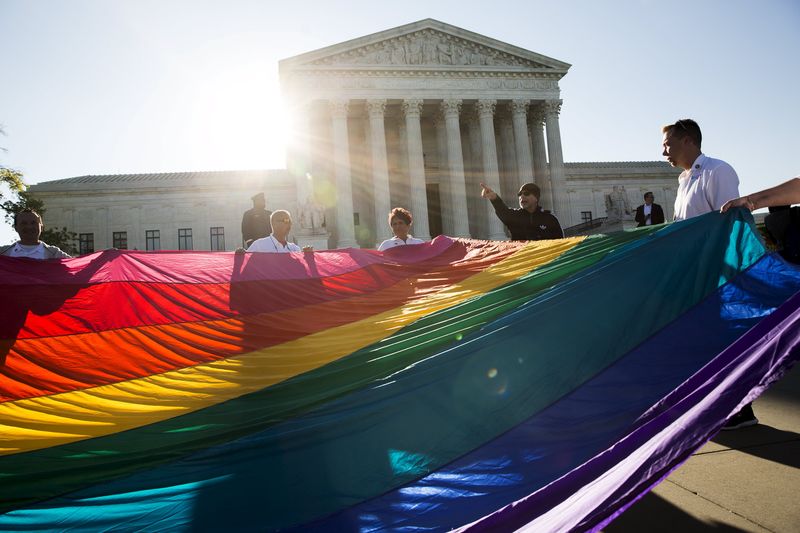By Lawrence Hurley
WASHINGTON (Reuters) - The U.S. Supreme Court appeared sharply divided on Tuesday on whether the Constitution guarantees a right to same-sex marriage, but pivotal Justice Anthony Kennedy seemed to inch cautiously toward legalizing gay nuptials nationwide.
In 2-1/2 hours of arguments, the nine black-robed justices peppered lawyers on both sides of the issue with questions in the landmark case centering on a contentious social issue, but appeared split as they often do along ideological lines.
Kennedy, a conservative who often casts the deciding vote in close cases and has a history of backing gay rights, posed tough questions to both sides but seemed to give hope to gay marriage advocates by stressing the nobility and dignity of same-sex couples.
At one point during the arguments in the decorous white-marble, crimson-draped courtroom, a protester shouted that the justices would "burn in hell" if they backed gay marriage. He was dragged by police screaming from the packed courtroom and was later charged with several misdemeanors.
The court's four liberal justices seemed willing to vote in favor of gay marriage, while the court's conservatives, including Chief Justice John Roberts, appeared inclined to back the right of states to restrict the definition of marriage.
During the first part of the argument, focusing on the question of whether there is a constitutional right for gay couples to marry, Kennedy challenged one of the key assertions made by states that ban gay marriage: that same-sex couples do not have the same bonds with their children as straight couples.
"That was very interesting, but it's just a wrong premise," Kennedy told John Bursch, the lawyer arguing in favor of state bans.
Kennedy told Bursch his argument "assumes that same-sex couples cannot have the more noble purpose" shown by opposite-sex couples when marrying. Kennedy also questioned Bursch's argument that marriage is not a "dignity bestowing" right.
Kennedy repeatedly used similar language in a 2013 ruling he wrote in which the court struck down a federal law that denied federal benefits to same-sex married couples.
The first part of the arguments focused on whether the Constitution's guarantees of due process and equal protection under the law mean states must allow gay couples to marry. The second concerned whether states must recognize same-sex marriages performed in other states.
Kennedy asked just one question during the hour-long second part of the argument. That could indicate he did not think the court would need to decide that matter because it would rule that gay couples have a right to marry nationwide.
Earlier, Kennedy sounded conflicted about the centuries of history in which marriage has been limited to opposite-sex couples.
"This definition has been with us for millennia, and I think it's very difficult for this court to say, oh well, we know better," Kennedy said.
A lively crowd estimated at more than 1,000 people, with those favoring gay marriage outnumbering those opposed, gathered outside the white marble courthouse as the justices heard arguments in the case, known as Obergefell v. Hodges.
RULING DUE IN JUNE
The justices are due by the end of June to deliver what promises to be their most anticipated ruling of the year.
The arguments centered on gay marriage bans in Kentucky, Michigan, Ohio and Tennessee, four of the 13 states that currently prohibit it.
Public support for gay marriage has steadily grown in recent years. Before it became legal in Massachusetts in 2004, gay marriage was not permitted in any state. It is now allowed in 37 states and Washington, D.C.
Roberts gave no sign he is likely to join the liberals. He, like Kennedy, stressed the swift changes in attitudes toward gay marriage and questioned whether it was the court's role to decide it once and for all.
"Closing of debate can close minds," Roberts said. Roberts also seemed unwilling to require states to recognize marriages that take place in other states.
Mary Bonauto, the lawyer arguing in favor of same-sex marriage, faced tough questions from conservative justices.
Justice Antonin Scalia questioned whether clergymen who oppose same-sex marriage would be required to officiate over ceremonies. Justice Samuel Alito asked whether, in theory, polygamous relationships or marriages between siblings could be allowed if the court embraced same-sex marriage.
Liberal Justice Elena Kagan, who came across as the court's strongest gay marriage supporter, questioned the notion that restricting marriage to opposite-sex couples would help encourage stable environments for children. She said many gay couples want to adopt children. If gay marriage is allowed, more people would be able to adopt, Kagan said.
"More adopted children and more marital households, whether same sex or other sex, seems to be a good thing," Kagan said.
Opponents say same-sex marriage legality should be decided by states, not judges. Some opponents argue it is an affront to traditional marriage between a man and a woman and that the Bible condemns homosexuality.

President Barack Obama's administration argued on the side of same-sex marriage advocates. He has said he hopes the court issues a ruling preventing states from banning gay marriage.